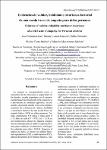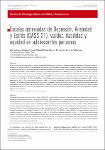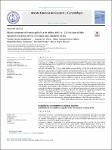Mostrar el registro sencillo del ítem
Evidence of validity, reliability and factor invariance of a brief scale of empathy for Peruvian children [Evidencias de validez, fiabilidad e invarianza factorial de una escala breve de empatía para niños peruanos]
| dc.contributor.author | Ventura-León, José | |
| dc.contributor.author | Landa-Barzola, Manuel | |
| dc.contributor.author | Valencia, Pablo | |
| dc.contributor.author | Tocto-Muñoz, Shirley | |
| dc.contributor.author | Manzanares-Medina, Eduardo | |
| dc.date.accessioned | 2022-06-16T20:45:42Z | |
| dc.date.available | 2022-06-16T20:45:42Z | |
| dc.date.issued | 2021-01-02 | |
| dc.identifier.citation | Ventura, J., ...[et al.]. (2021). Evidence of validity, reliability and factor invariance of a brief scale of empathy for Peruvian children [Evidencias de validez, fiabilidad e invarianza factorial de una escala breve de empatía para niños peruanos]. Interdisciplinaria, 38(3). https://doi.org/10.16888/interd.2021.38.3.3 | es_PE |
| dc.identifier.issn | 0325-8203 | |
| dc.identifier.uri | https://hdl.handle.net/11537/30606 | |
| dc.description.abstract | La empatía es conceptualizada como la conciencia de las emociones y cogniciones de los demás y resulta importante en el contexto escolar para el favorecimiento de la convivencia y prevención de conductas agresivas. En ese sentido, el presente estudio tiene como objetivo examinar las evidencias de validez, fiabilidad e invarianza factorial de una escala breve de empatía básica (BES) en niños peruanos. Por ende, participaron 838 niños y niñas entre 8 y 12 años de edad (M = 9.95; DE = 1.13) de seis instituciones educativas, algunos colegios fueron utilizados para el análisis exploratorio y otros para confirmar. Se administró la BES que fue adaptada para niños (BES-I). Respecto al análisis de datos, se efectuó un análisis factorial exploratorio (AFE) y confirmatorio (AFC), además del análisis de invarianza factorial, para finalmente examinar la fiabilidad mediante el coeficiente omega (ω). Los resultados del AFE sugieren una medida bidimensional oblicua (cognitivo y afectivo). Del mismo modo, el AFC reafirmó estos resultados por presentar buenas bondades de ajuste (CFI ≥ .97, RMSEA ≤ .04); estos hallazgos son coherentes con los postulados teóricos que sugieren que la empatía es un constructo compuesto por factores específicos y no por un solo factor. La invarianza factorial de acuerdo con el sexo demostró que la BES-I mide lo mismo en niños y niñas y la fiabilidad obtenida mediante el coeficiente ω fue superior a .65, lo cual indica que es aceptable. Se concluye que la BES-I es un instrumento breve que puede resultar valioso en la comprensión de la empatía infantil en futuras investigaciones. | es_PE |
| dc.description.abstract | Childhood is a period where prevention and promotion actions can be carried out; therefore, the study of positive variables such as mindfulness, well-being, resilience and empathy has increased for some years. In this sense, empathy is conceptualized as the awareness of the emotions and cognitions of others in socio-emotional theoretical models; additionally, its study is important in the school context for the promotion of coexistence and prevention of aggressive behavior. Likewise, women are known to present higher empathy prevalence than men. Within the perspectives of this construct related to the cognitive and affective states, it became the most relevant in various studies and measurement instruments; despite this, there is a lack of brief instruments to measure empathy in the Latin American context. In this sense, this study aims to examine the evidence of validity, reliability and factor invariance of a short Basic Empathy Scale (BES) in Peruvian children. For these purposes, 838 children between 8-12 years old (M = 9.95; SD = 1.13) from six schools participated, some of them were used for exploratory analysis and others for confirmation. Likewise, eleven professionals from the clinical field and with experience in children’s issues participated and applied the two criteria-based BES: relevance and representativeness. Prior to this, ten children were interviewed to verify the clarity of the items. After this procedure, trained research assistants created a version of the BES for children (BES-I) for children in their respective classrooms; who also requested parental authorization by signing an informed consent. The data was analyzed by R statistical software of free access using packages such as ‘psych’, ‘lavaan’, ‘MBESS’, ‘semTools’; two factor analyses were performed; one, exploratory (AFE) and two, confirmatory (AFC), in a third moment a multigroup analysis was performed to evaluate to what extent the factor structure is invariant in the subgroups of males and females; finally, reliability was calculated using the omega coefficient (ω). The results show that the items have the representativeness and relevance in their content according to eleven experts in clinical psychology, whose responses were quantified by V of Aiken reaching values higher than .70. The internal structure in the AFE indicated the presence of two related factors (cognitive and affective) that explain 35 % of the model variance. Similarly, the AFC verified these results by showing optimal goodness of fit (IFC ≥ .97, RMSEA ≤ .04) in the two-factor model; these empirical findings are consistent with theoretical assumptions suggesting that empathy is a construct comprising specific factors rather than a single factor. As for the multi-group analysis according to sex, the invariance of the BES-I was evidenced, when observing that the differences between the base or configuration model and those with restricted thresholds, loads, variance and covariance are minimally recommended; in that way, the BES-I is established to measure the same in boys and girls; finally, regarding the reliability in the two-factor model, the coefficient ω is observed to exceed .65 for both the cognitive factor (ω = .66) and the affective factor (ω = .66). It is concluded that the BES-I is a brief instrument to be interpreted in a two-dimensional oblique way, taking as reference the theoretical cognitive-affective perspective; thus, the validity evidence of the BES-I is valuable for the understanding of child empathy in future Latin American researches. | es_PE |
| dc.format | application/pdf | es_PE |
| dc.language.iso | spa | es_PE |
| dc.publisher | Centro Interamericano de Investigaciones Psicológicas y Ciencias Afines del Consejo Nacional de Investigaciones Científicas y Técnicas (CIIPCA) y el Centro Interdisciplinario de Investigaciones en Psicología Matemática y Experimental (CIIPME) | es_PE |
| dc.rights | info:eu-repo/semantics/openAccess | es_PE |
| dc.rights | Atribución-NoComercial-CompartirIgual 3.0 Estados Unidos de América | * |
| dc.rights.uri | https://creativecommons.org/licenses/by-nc-sa/3.0/us/ | * |
| dc.source | Universidad Privada del Norte | es_PE |
| dc.source | Repositorio Institucional - UPN | es_PE |
| dc.subject | Psicometría | es_PE |
| dc.subject | Validez | es_PE |
| dc.subject | Fiabilidad | es_PE |
| dc.subject | Empatía | es_PE |
| dc.subject | Niños | es_PE |
| dc.title | Evidence of validity, reliability and factor invariance of a brief scale of empathy for Peruvian children [Evidencias de validez, fiabilidad e invarianza factorial de una escala breve de empatía para niños peruanos] | es_PE |
| dc.type | info:eu-repo/semantics/article | es_PE |
| dc.publisher.country | AR | es_PE |
| dc.identifier.journal | Interdisciplinaria | es_PE |
| dc.description.peer-review | Revisión por pares | es_PE |
| dc.subject.ocde | https://purl.org/pe-repo/ocde/ford#5.01.02 | es_PE |
| dc.description.sede | Los Olivos | es_PE |
| dc.identifier.doi | https://doi.org/10.16888/interd.2021.38.3.3 |







